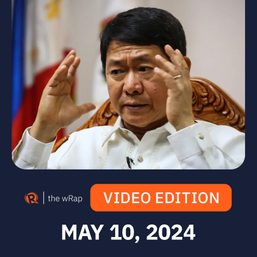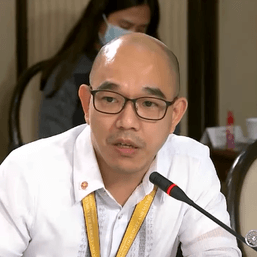SUMMARY
This is AI generated summarization, which may have errors. For context, always refer to the full article.
![[ANALYSIS] Duterte’s unconstitutional orders](https://www.rappler.com/tachyon/2021/10/president-misusing-military-powers.jpg)
With barely 7 months left before the next elections, the President issued what could be (outside of EJKs) his most questionable order: a verbal directive to the uniformed services – military and police – not to enforce any warrants of arrest issued by the Senate.
We have witnessed how the President has used his weekly COVID-19 briefings to defend personalities involved in the Senate investigation. This latest “order,” however, is dangerous territory.
There are many things to unpack in this latest move. First is the fact that at the time the “order” was given, the only people in danger of Senate contempt were private individuals. One of them is not even a Filipino. As such, at this juncture, the President’s order to the PNP and the military is not so much to protect his Cabinet but to shield these private parties from accountability.
Why is the President extending extraordinary protection to these chosen ones? He claims he is “concerned for constitutional rights.” It is a shame that he tends to remember those often when Chinese are involved but not when thousands of our countrymen were subjected to extrajudicial killings (EJKs).
Next, the “order” is of doubtful constitutionality. Senate v. Ermita is a landmark case that involved former president Gloria Macapagal Arroyo’s order to stop Cabinet members from participating in a Senate investigation. The Supreme Court’s ruling in that case is clear: the Executive is not allowed to “frustrate” Congress’ efforts to investigate. While there is an exception – executive privilege – it would be interesting to find out how an inquiry on alleged waste of pandemic funds by private individuals would involve “presidential secrets.” One might as well have the President invoke the right against self-incrimination.
Third, the President is not a King who can order his army to do anything he wants. Presidents answer to the Constitution. And while a commander-in-chief has authority, it is limited by the Articles of War (Sections 65 and 66), which require either a “lawful command” or a “lawful order.” Similarly, the Revised Penal Code’s provisions on disobedience necessitate that the order given is “lawful.” With the High Court’s ruling in Senate v. Ermita, this “order” hardly qualifies. Even without that decision, it will be difficult to explain to our uniformed services how an order to ignore warrants qualifies as “lawful.” Warrants after all are, by definition, embodiments of law and order.
Fourth, the President’s powers as “commander-in-chief” were given by the Constitution for the protection of the people. They are not there so he can extend immunity to his friends involved in a Senate probe, one of whom is not even our countryman. A real commander-in-chief wages war against enemies of the state, not another branch of government. He also doesn’t insult his commanders’ intelligence by a spurious excuse that he wants to keep them “out of a political conflict,” only to place them right in the middle of one and challenging their professionalism. Our men and women in uniform serve the country, not personal interest. And the threats they have sworn to oppose are the kind the Senate is trying to uncover.
Duterte buys time
With all these at play, why would he issue such an “order” then? Because his objective is not to win but to delay.
He doesn’t fear impeachment which has to originate from the House of Representatives. What he wants is to invite a challenge in the Supreme Court that will stupefy or delay the Senate probe.
This gambit ignores the fact that the highest court of the land serves a different constituency, a painful lesson that former presidents – such as Fidel Ramos (Santiago v. Comelec), Arroyo (see Senate vs Ermita, Lambino v. Comelec) and even the late Benigno Aquino III (Belgica v. Ochoa) – have learned. It is also worth noting that while the present Court was willing to expand executive authority in the Mindanao Martial Law cases, that was under a context of protecting the people from the Marawi Siege. There is no such siege here. What we have is a group of individuals being investigated for receiving billions in pandemic funds, some of whom bought sports cars immediately after.
More importantly, upholding an “order” that allows the uniformed services to ignore warrants unless the executive agrees first is dangerous to the judiciary itself. Why? Because it’s not Congress that relies on warrants (and other papers) on a daily basis to remain a relevant force in the Constitution’s balance of power – it’s the courts. The force of a writ or warrant lies in its mere issuance. It needs no “pre-clearing” with the executive branch. Our law enforcers are trained to respect warrants, this aberration of an “order” tells them compliance is optional or subject to Executive validation. To uphold the “order” weakens judicial independence, not just Congress.
The President is keenly aware of all these. But again, the lack of legal basis, misusing our armed services, or losing a Supreme Court case aren’t his concerns.
Extend hold on power
In the game he is playing, the only thing that matters is he stifles the Senate for the next 7 months. It will wreck checks and balances and politicize the armed services, but to him it will be worth it. Why? Because unlike any other president that came before, this one needs to extend his hold on power.
And this early, there are hints of desperation seeping through the bravado. We see this as he first accepted a nomination to run for vice president, then asked his loyal lieutenant to do so in his place, and then announcing he is resigning from politics – for the second time. When a sitting president with all his resources and vaunted “91% approval” lands as a poor second to Senate President Vicente Sotto III, someone is definitely worried.
If there is any doubt about the constitutional wisdom preventing a sitting president from experimenting with ways to extend his term, then take a long, hard look at what this one is willing to do just this week. Ferdinand Marcos literally padlocked Congress. The current occupant intends to cripple it for threatening his chances. And he will drag everyone down – our courts, and uniformed services included – just to do it. – Rappler.com
John Molo is a commercial law litigator who enjoys reading and learning about the Constitution and its intersection with politics. He teaches Constitutional Law at UP Law-BGC, where he also chairs the Political Law Cluster of the Faculty. He is past chairman of the IBP Law Journal. He led the team that sued the Aquino administration and invalidated the PDAF.
Add a comment
How does this make you feel?
![[WATCH] Bamban POGO scandal: There’s a bigger fish than Alice Guo](https://www.rappler.com/tachyon/2024/07/inside-track-tcard-bamban-pogo.jpg?resize=257%2C257&crop=435px%2C0px%2C1080px%2C1080px)








There are no comments yet. Add your comment to start the conversation.